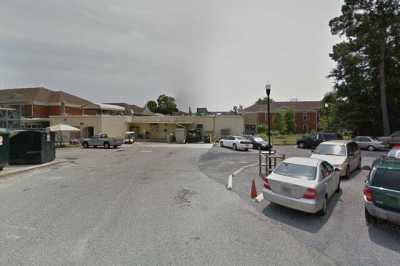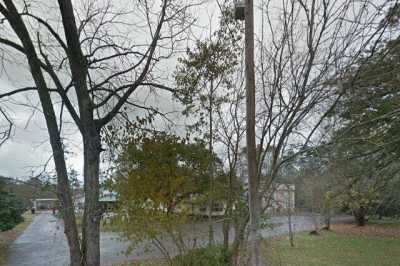
With grand architecture and a scenic coastline, assisted living in the Charleston area offers an array of living options that never skimp on charm or Southern hospitality. In this guide, we’ll look at what it’s like to live in an assisted living community in Charleston. We explain costs, the methods seniors in Charleston use to pay for assisted living, and South Carolina’s assisted living laws and regulations. You will also find information about transportation around the city, health care options, and the array of local, senior-friendly activities in this historic city with year-round temperatures that never seem to get too hot or cold.
10 Best Assisted Living Facilities in Charleston, SC
With grand architecture and a scenic coastline, assisted living in the Charleston area offers an array of living options that never skimp on charm or Southern hospitality. In this guide, we’ll look at what it’s like to live in an assisted living community in Charleston. We explain costs, the methods seniors in Charleston use to pay for assisted living, and South Carolina’s assisted living laws and regulations. You will also find information about transportation around the city, health care options, and the array of local, senior-friendly activities in this historic city with year-round temperatures that never seem to get too hot or cold.Read more
Charleston Assisted Living Facilities | 390 Reviews
Our free advisors can help
- Compare local facilities
- Determine care type
- Schedule tours
- Evaluate pricing
- What families are saying about assisted living in Charleston
- Costs of assisted living in the Charleston area
- How people pay for assisted living in Charleston
- Charleston laws and regulations for assisted living facilities
- Get to know assisted living in Charleston
- What assisted living is like in Charleston
- Seniors’ guide to the city of Charleston
- Best hospitals for seniors in Charleston
- Transportation for seniors in Charleston
- Senior activities in Charleston
What families are saying about assisted living in Charleston
Recent reviews for assisted living in Charleston
Dayspring Assisted Living in Hollywood, SC
Daysprings of Johns Island
Cypress Square in Summerville, SC
Costs of assisted living in the Charleston area
In Charleston, the average cost of an assisted living community is $4,397 per month, which includes the cost of rent, fees, and add-ons.[01] This is lower than the national median of $4,807 according to data from A Place for Mom’s Cost of Long-Term Care and Senior Living Report.
The prices below represent average starting rent costs for assisted living, in the surrounding area, before add-on fees, which could be helpful for comparing pricing across the area.
Average monthly cost of Assisted Living in Charleston, SC vs. nearby cities
Charleston, SC
How people pay for assisted living in Charleston
Many families combine several payment types to cover the costs of assisted living. For example, room and board is rarely covered by health insurance, leaving families to pay for this expense from private funds like a personal or retirement savings account. Insurance such as Medicare or Medicaid and veterans benefits can cover many of the care services provided at assisted living communities. We explore various payment options in the following section to help determine the financial approach that’s right for you or your loved one.
Personal savings accounts, returns from investment portfolios, pensions, or Social Security benefits are some of the more common examples of private funds. Using long-term care insurance or drawing funds from a health savings account are also ways families pay for assisted living costs. Depending on your family’s long-term care planning, assets, and resources, other common ways seniors pay for assisted living include the following:
Number of veterans who live in Charleston, according to the U.S. Census Bureau
About 48% of Charleston veterans are 65 or older, according to the U.S. Census Bureau
Using VA benefits to pay for assisted living in Charleston
The U.S. Department of Veterans Affairs (VA) is a key resource for veterans and their surviving spouses in need of long-term care. There are several VA benefits programs that provide financial assistance for senior care and living costs in assisted living facilities.
The Ralph H. Johnson Department of Veterans Affairs Medical Center in central Charleston offers health services for Charleston’s veterans. For support with nonmedical services, such as benefits and applications, the Charleston Vet Center is another VA facility that supports veterans in the Charleston area.
Support finding and applying for VA benefits
Benefits counseling through the VA or veterans service organizations (VSOs) can help veterans and their spouses find and apply for VA benefits. Veterans are encouraged to take advantage of these services because the application process can be complicated. Often mistakes or missed deadlines can lead to delays and sometimes a denial of benefits.
What are VSOs?
VSOs assist veterans with benefits counseling and other veteran-centered programs. VSOs offer the expertise of veteran service officers who receive VA training and accreditation to provide assistance and veteran-focused information.
Operating at the local, state, and national levels, examples of common VSOs include:
- Vietnam Veterans of America
- Veterans of Foreign Wars (VFW)
- American Legion
Many of Charleston’s VSO’s operate out of the Charleston County Veterans Affairs Office. There are also several VSO’s that have offices around the Charleston metropolitan area, and you can find contact information listed in the resources section below.
Resources for Charleston veterans
Ralph H. Johnson Department of Veterans Affairs Medical Center
109 Bee St.
Charleston, SC 29401-5799
Phone: 843-577-5011
Charleston Vet Center
3625 W. Montague Ave.
North Charleston, SC 29418
Phone: 843-789-7000
Charleston County Veterans Affairs Office
4045 Bridge View Drive
North Charleston, SC 29405
Phone: 843-874-6360
The South Carolina Department of Veterans’ Affairs
1800 St. Julian Place, Suite 305
Charleston, SC 29204
Phone: 803-734-4014
American Legion Post 179
1748 Ashley Hall Road
Charleston, SC 29414
Phone: 843-991-6308
VFW Post 445
1639 Camp Road
Charleston, SC 29412
Phone: 843-795-9419
Vietnam Veterans of America Chapter 780
520 Folly Road
Charleston, SC 29412
Phone: 843-762-7546
Medicaid is a health insurance program for low-income individuals. The program is run by individual states with oversight by the federal government. Healthy Connections is the name of South Carolina’s Medicaid program, which provides health care coverage for seniors 65 and over whose monthly income is below $1,255.[03]
Healthy Connections covers a variety of care and services for seniors including the following:[04]
- Doctor office visits
- Home health care
- Hospital inpatient, outpatient, and emergency room services
- Lab and x-ray services
- Medical equipment
- Nursing facility care
- Occupational and physical therapy
- Prescription medications
- Speech-language therapy
- Transportation to medical appointments
- Vision care
South Carolina Medicaid plans that help pay for assisted living
Healthy Connections doesn’t cover the cost of room and board for assisted living in South Carolina. However, there are three programs that can help seniors in the Charleston area pay for care costs wherever they call home, including assisted living facilities.
- The Home Again program provides support for seniors living in a nursing facility or hospital to transition back to their community home. Seniors enrolled in the program can receive assistance through a transition coordinator and case manager. Once settled in their community, seniors can access care supports that may include the following services:[05]
-
- Home delivered meals
- Adult day care
- Personal care
- Companion care
- Limited assistance with utility deposits, and groceries
- Seniors who require a nursing home level of care but prefer to remain in their home community may qualify for the Community Choice waiver. This program provides coverage for assistive services that seniors can receive where they live, including an assisted living facility.[06]
- Healthy Connections Prime is for seniors who are dually eligible for Medicaid and Medicare. This program provides a streamlined approach that keeps services and care consolidated under one unified plan.
Assistance applying for Medicaid
There are several resources in the Charleston area to help seniors apply for Medicaid and understand the services they are eligible for. Individuals can seek information and apply for Medicaid on the Healthy Connections website. For seniors seeking information on eligibility and support completing an application, the following organizations can provide assistance:
- South Carolina Department on Aging
- Trident Area Agency on Aging
Charleston resident Medicaid resources
Charleston County Healthy Connections Office
3685 Rivers Ave. Suite 102
North Charleston, SC 29405
Phone: 888-549-0820
Trident Area Agency on Aging
5895 Core Road., Suite 419
North Charleston, SC 29406
Phone: 843-554-2275
South Carolina Department on Aging
1301 Gervais St. Suite 350
Columbia, SC 29201
Phone: 800-868-9095
Long-Term Care Ombudsman Program
5895 Core Road Suite 419
North Charleston, SC 29406
Phone: 843-554-2275
A federal health insurance program for those 65 and older, Medicare doesn’t cover living costs at assisted living facilities. However, regardless of where a senior lives, they can use Medicare to help offset medical care costs. Medicare breaks its coverage into three different parts:[07]
- Part A, hospital insurance, pays for skilled nursing facility care, inpatient hospital care, and home health care.
- Part B or medical insurance, covers doctor’s visits, lab work, x-rays, and other outpatient services performed in a clinic.
- Part D is also called drug insurance and pays for prescriptions, vaccines, and other medications.
Additional information about Medicare-covered services can be found on the Medicare website.
Eligibility and applying for Medicare in Charleston
Seniors become eligible for Medicare when they turn 65. Individuals with a disability, End-Stage Renal Disease, or ALS may qualify for Medicare earlier. Medicare enrollment is usually automatic for seniors already receiving Social Security benefits. For seniors who need to complete an application, the Medicare application can be found on the Social Security website.
There are also several state and local resources for seniors who are seeking help understanding benefits or require guidance with the Medicare application process.
The South Carolina State Health Insurance Assistance Program (SHIP) offers no-cost counseling for anyone in need of help understanding and applying for Medicare.
The Healthy Connections Prime program offers coordinated care for dually eligible seniors. Eligible seniors may also qualify to receive assistance paying for Medicare premiums, copayments, and deductibles. For assistance understanding eligibility requirements and navigating the application process, connect with the Health Connections Prime ombudsman.
Charleston resident Medicare resources
Social Security Administration Office
1463 Tobias Gadson Blvd.
Charleston, SC 29407
Phone: 800-772-1213
Hours: Monday through Friday, 8 a.m. – 4 p.m.
South Carolina Department on Aging
State Health Insurance Assistance Program (SHIP)
1301 Gervais St., Suite 350
Columbia, SC 29201
Phone: 800-868-9095
Long-Term Care Ombudsman Program
5895 Core Road Suite 419
North Charleston, SC 29406
Phone: 843-554-2275
Charleston laws and regulations for assisted living facilities
Assisted living facilities in South Carolina are licensed as Community Residential Care Facilities by the South Carolina Department of Health and Environmental Control (DHEC). Facilities must adhere to licensing regulations for assisted living facilities, which govern several categories:
Resident care and services. The following examples highlight the regulations that address the care and services assisted living facilities are required to provide for residents:
- A resident’s needs must be assessed within 72 hours of their admittance.
- An individualized care plan must be created within the first week.
- The facility must provide care as directed by a physician, which may include specialty diets, emergency medical care, dental care, counseling, and medications.
- The facility must provide assistance and items necessary for residents to maintain their personal cleanliness.
- The facility shall provide opportunities for residents to participate in religious services.
In addition to licensing regulations, residents of assisted living in South Carolina are protected by the Bill of Rights for Residents of Long-Term Care Facilities.
Staff and training. The assisted living facility must have a licensed administrator and staff must receive the training necessary to perform their duties. Other staff and training regulations include:
- There must be at least one staff member for every eight residents during peak hours.
- Staff members cannot have a prior conviction for abuse, neglect, or exploitation of a vulnerable adult.
- Staff must maintain current CPR and first aid training certificates.
Inspections
The DHEC performs unannounced annual inspections of long-term care facilities in Charleston, which are required as part of South Carolina’s licensing requirements. Inspection reports can be found using the online Survey and Certification search tool.
Additional information about South Carolina’s assisted living laws and regulations can be found on our overview of assisted living in South Carolina page.
South Carolina Department of Health contact information
South Carolina Department of Health and Environmental Control
2600 Bull St.
Columbia, SC 29201
Phone: 855-472-3432
COVID-19 regulations for Charleston assisted living communities
Charleston does not currently have COVID-19 mandates for assisted living facilities. The city offers general guidelines around staying safe:
- Vaccinations. Per CDC guidelines, vaccinations are recommended.
- Masking. Masks are advised in public settings.
- Facility cleanliness. High-traffic areas should be disinfected frequently.
- Social distancing. It’s recommended that contact be avoided with those who are exhibiting symptoms of COVID-19.
- CDC guidelines. The Charleston guidelines match the recommendations from the CDC.

Vaccinations. Per CDC guidelines, vaccinations are recommended.

Masking. Masks are advised in public settings.

Facility cleanliness. High-traffic areas should be disinfected frequently.

Social distancing. It is recommended that contact with those who are exhibiting symptoms of COVID-19 be avoided.

CDC guidelines. The Charleston guidelines match the recommendations from the CDC.
Get to know assisted living in Charleston
What assisted living is like in Charleston
Charleston stands out for its iconic colonial architecture and waving palms along the cobblestone streets, all of which are set against the backdrop of stunning sunsets. The historical skyline pairs nicely with comfortable weather and beautiful natural settings from relaxing beaches to wild coastal estuaries teeming with wildlife.
A Place for Mom partners with two stand-alone assisted living communities in Charleston and eight that combine assisted living with other care types like memory care and independent living.
Activities and amenities
Charleston assisted living facilities have plenty of extras to help residents enjoy the comforts of home while staying active. Nearly all of our partner communities employ an activity director offering residents a full schedule of activities that match their interests. Art classes, happy hours, live musical performances, and day trips to Charleston’s historic and coastal sights are just a few examples. In many communities, common areas are available to all residents for getting cozy with a book or joining a group trivia game. Or gather with friends in an on-site movie theater to watch an old favorite or a newer release.
Southern hospitality and care
Assisted living in Charleston makes resident needs a top priority. From assistance with activities of daily living to concierge services, our partner communities take pride in the hospitality they provide. With 24/7 staff at all communities, residents can feel at ease knowing assistance is available any time of the day. Specialized care services are available on-site at most communities, including visiting podiatrists, physical and occupational therapists, and speech therapists. And more than half of our partners have a doctor on call.
Prepared meals and dining for easy living
Our partner assisted living communities in Charleston offer restaurant-style dining with three delicious meals each day. From Southern favorites to international cuisine, chef-prepared meals are very much a part of the daily culture in Charleston’s assisted living communities. Some facilities also have on-site cafés or bistros for those times when residents just want to grab a snack with friends or feel like doing something a little different. Private dining rooms are available for those special occasions with family. For seniors with special preferences or specific dietary needs, more than half of our partner communities offer vegetarian or low/no sodium meal options.
Seniors’ guide to the city of Charleston
Number of seniors over the age of 65 currently living in Charleston[08]
Best hospitals for seniors in Charleston

Medical University of South Carolina Health (MUSC)
The top-rated hospital in Charleston, MUSC is recognized in 22 types of care including cardiology and cancer care.

Roper is nationally ranked by U.S. News and World Report for its rehabilitation program. It’s also rated as high performing in 12 other procedures and conditions.

Listed as one of the top hospitals in the area for adult specialties such as orthopedics, East Cooper Medical Center is located just across the Cooper River in Mount Pleasant.
Transportation for seniors in Charleston
Most Charlestonians get around by car, and 90% of our partner communities provide parking for seniors who still drive. Additionally, complimentary transportation is offered at 90% of our partner communities and others have pay-per-ride options. The assisted living communities we partner with make getting around easy for seniors who no longer drive or those who prefer to leave the driving to someone else.
Charleston Area Regional Transportation Authority (CARTA) is an option for showing visitors around the city. There are several routes available and seniors can ride at a discounted rate. For touring around historic downtown Charleston, the Downtown Area Shuttle (DASH) makes getting around without a car easy.
CARTA OnDemand is a program that operates in cooperation with ride-hailing services like Uber and Lyft. The service is limited to a specific service area but offers a safe, low-cost transportation option for seniors. Tel-A-Ride paratransit services are available to qualified mobility-impaired seniors.
Downtown Charleston is quite pedestrian friendly with safe streets and bike lanes. Charleston’s walkability, bikeability, and public transportation options are rated on a scale of 0-100 by Walk Score, with 100 being the best. Charleston received the following scores:

Walk Score

Transit Score

Bike Score
Senior activities in Charleston
Stretching along the coast, Charleston was established more than three centuries ago. Notes of the past are captured in the city’s architecture, culture, and activities. While there are plenty of modern things to do, history is at the heart of this Southern city.
Step into the past
Rainbow Row was once the heart of Charleston’s commerce and trade. These days it’s a designated historic landmark and a great place for walking or taking a horse-drawn carriage tour. The Nathaniel Russell House Museum is located in the center of Rainbow Row and provides a view into colonial life with tours, educational classes, and historical events.
You can learn about Charleston’s roots at one of the many museums and historical sites around Charleston including the following:
- The Charleston Museum, also known as “America’s first museum” was originally home to Thomas Heyward Jr., one of the signers of the Declaration of Independence. Visitors can view everything from colonial art to a robust timeline of the area’s natural history.
- On the darker side of Charleston’s history, the Old Slave Mart Museum provides insight into one of America’s busiest slave trade locations.
- Take a ferry to Fort Sumter where the Civil War began on April 12, 1861, when the Confederates fired the first shot on the federal garrison. The ferry and many of the sites have accessibility options.
- Established in 1807, the Charleston City Market is another must-see. Open daily, visitors can find collections of Southern art and crafts, like the sought-after hand-woven sweetgrass baskets.
The natural South
Magnolia Plantation and Gardens encompasses more than 400 acres of exotic gardens and one of the South’s oldest plantations. Visitors can take a garden tour or a hop on a train to explore the surrounding nature. The train and the boat offer accessibility options but due to its historical building status, the guided house tour does not.
Charleston’s Waterfront Park offers eight acres of nature and waterfront views. Walking paths wind through the park and there are plenty of benches and other areas to rest and take in the views. The park also has intimate garden rooms for relaxing in the shade.
Folly Beach is set on a barrier island with six miles of beaches, shops, and restaurants. Make sure to check out the Porgy House, where Charles Gershwin wrote his famous folk opera Porgy and Bess.
Local wildlife and art
The South Carolina Aquarium is a great place to take the grandkids where they can learn about sea turtles or even pet a stingray. Accessibility is central to the experience: Wheelchairs can be checked out for free, special sensory resources are available, and service animals are allowed.
Charleston is fantastic for fans of the arts. There are several museums that showcase visual art and a variety of performing arts venues including the following:
- The Gibbes Museum of Art offers this accessibility guide to ensure you have a great experience while touring exhibits and taking part in educational programs.
- Charleston’s Gaillard Center offers the opportunity to enjoy ballet, live music, or even comedy at this fully accessible venue.
- Music lovers will marvel at the list of talent that performs at the Charleston Music Hall. From touring musicians to engaging film festivals, this venue has a little something for everyone and even better, the hall has six accessible seating areas.
Frequently Asked Questions
Ashley Gardens Transitional Assisted Living and Memory Care, Somerby of Mount Pleasant and The Claiborne at Brickyard Crossing are the top-rated Assisted Living facilities near Charleston, SC. These Assisted Living facilities received the highest rankings based on verified family reviews. See full list of communities.
The average cost of Assisted Living in Charleston is 4506.01 per month. This cost may vary based on location, amenities, floorplan, level of care and other factors.
References
A Place for Mom. (2024). A Place for Mom proprietary data.
United States Census Bureau. (2021). Veteran status (S2101): Charleston city [Data set]. American Community Survey.
South Carolina Department of Health and Human Services. (2024). Program eligibility and income limits.
South Carolina Department of Health and Human Services. (2019, November 19). Healthy Connections Medicaid brochure.
South Carolina Department of Health and Human Services. (2024). Home again.
South Carolina Department of Health and Human Services. (2024). Community choices waiver.
Centers for Medicare and Medicaid Services. Parts of Medicare.
United States Census Bureau. (2021). Population 65 and Over in the United States (S0103): Charleston city. [Data set]. American Community Survey.
United States Census Bureau. (2022). Median Income in the past 12 Months (S1903): Charleston city. [Data set]. American Community Survey.
U.S. News & World Report. (2023). Best hospitals in Charleston, SC.

More questions?
Ask an A Place for Mom local advisor at no cost.
- Mount Pleasant, South Carolina
- Summerville, South Carolina
- Goose Creek, South Carolina
- Moncks Corner, South Carolina
- Ladson, South Carolina
- Isle of Palms, South Carolina
- Awendaw, South Carolina
- North Charleston, South Carolina
- Folly Beach, South Carolina
- Seabrook Island, South Carolina
- Hanahan, South Carolina
- Hollywood, South Carolina
- Huger, South Carolina
- Brentwood, South Carolina
- Sylvia Lane, South Carolina
- Meggett, South Carolina
- Melrose, South Carolina
- Johns Island, South Carolina
- Osborn, South Carolina
- Cedar Springs, South Carolina


